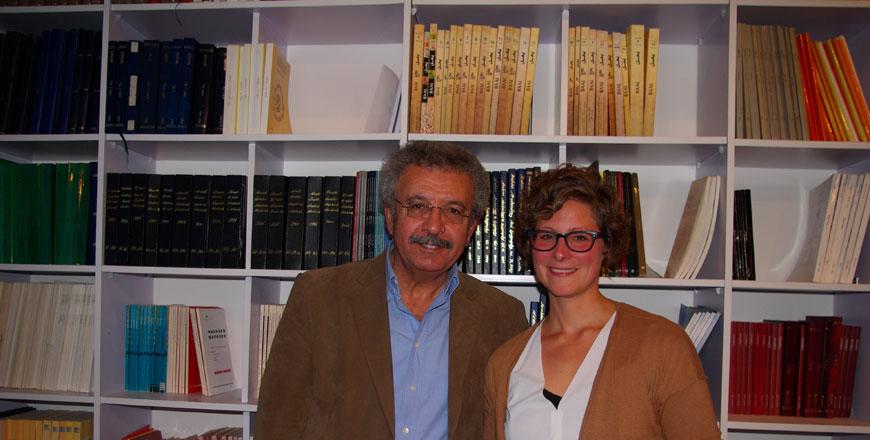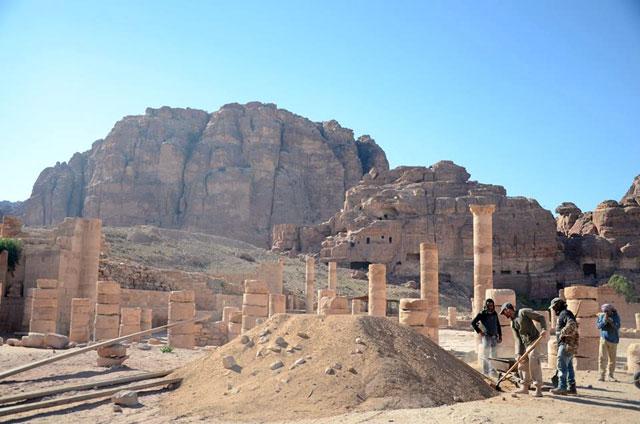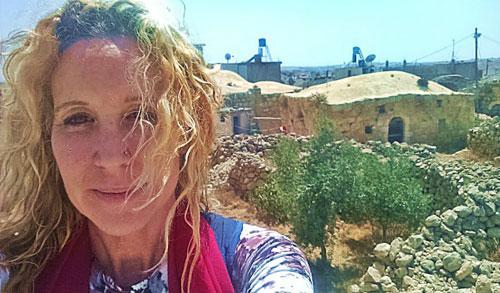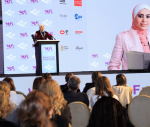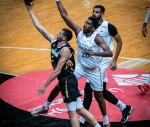You are here
Canadian scholar on a mission to connect the dots of ‘diverse’ Palestinian literature
By Saeb Rawashdeh - May 19,2016 - Last updated at May 19,2016
AMMAN — Not so long ago it was common to hear that “the golden age” of Palestinian literature ended with Mahmoud Darwish, said Nora Parr, a Canadian scholar specialised in modern Palestinian literature.
Parr, PhD scholar from the School of Oriental and African Studies (University of London), is among a small group of professionals working to continue changing this position.
Her journey for answers took her first to Arabic literature and then to the Palestine- “The decision to ‘go to Palestine’ and see the stuff of the books I was reading is, I think, still a journey that I am in the process of,”she explained.
“When I arrived to Jerusalem I stayed for a night in the Old City of before continuing on to Birzeit for a summer Arabic programme,” Parr recalled.
“I was struck by so many beautiful and agonising contradictions. I had been reading some of Ghassan Kanafani’s short stories — from his ‘Land of Sad Oranges’— and he is such a powerful writer that when I looked around me at the landscape of the city, I imagined that I saw it through both his characters’ eyes and my own; I was initially very much at a loss as to how to reconcile these different points of view.”
With time spent in Jordan, the West Bank and now Jerusalem, Parr said her journey to see “all of Palestine”, was as yet far from complete.
“Palestine holds so many pasts, includes so many locations and brings up so many questions that I think it is important to consider. I don’t imagine that this decision to ‘see Palestine’ – this quest really, if we are going to be poetic about it— will be fulfilled any time soon,” she stressed.
Elaborating on her research, she told The Jordan Times that it is about “more than just reading the texts, its about listening to how others –in Canada, the US, the UK, Jordan, the West Bank and Jerusalem—read and engage with the works; using the time I’ve had to read and research to add to or even initiate conversations on what Palestinian literature means today”.
In working to make sure that no one can say that Palestinian literature finished with Darwish, Parr said: “ I feel always that I am making an offering of knowledge-in-process, trying to connect and add to some of the really deep and critical debates in Arabic Literature and Palestine Studies.”
Parr cites the disruption and re-building of literary networks that came with the Nakbeh in 1948. “Archives were lost, whole libraries stolen, writers associations scattered in the four winds… so even now the process of reconstructing these resources and linking up the networks of Palestinian writers wherever they are, is still in process.”
And while it is absolutely true that there was a very great deal lost, work has been done to re-build that archive in so many different ways, she underlined.
“ Whether it is revealing the presence of the stolen book archive in Jerusalem, or the slow uncovering of family libraries, or simply piecing together the trajectories of materials that were kept safe through oral history projects or university field work in the closed-rooms of homes and offices,” Parr contemplated.
Regardless of the actual locations of the authors, the researcher remarked that modern Palestinian writers have shared a concern for the “same broad questions, more or less”.
“So there are authors like Ibrahim Nasrallah [born 1954 in Wihdat, Jordan], whose family fled from the Galilee during the Nakbeh and are now in Jordan, or Adania Shibli [born 1974 Shibli, Israel] who was born and raised north of Jenin , or Hussein Barghouthi [1954-2002, West Bank] from the village of Kobr near Ramallah,” Parr explained, choosing authors representative of only a small selection of the locations from which Palestinians write today. Despite these distinct upbringings, she claimed, each writes to carve out an imaginative space for what they imagine as their community.
“Nasrallah writes specifically about Palestinian identity, Palestinian history and what it means to think of Palestine that is whole and complete despite contemporary circumstance; Shibli, on the other hand, refuses to categorise her work as a national project and she also refuses to be identified as any ‘sub-category’ of Palestinian. She is a Palestinian ‘plain and simple,’ whose written works are –she would say—about the human condition today; Barghouthi, who has, I suppose, the least complicated story in terms of identity, has the most painful and searching writing when it comes to the question of identity.”
The very issue of “defining” where a Palestinian author is “from”, or what it means to be “from” somewhere is complex. The questions of when (in time), where (in space), and with whom (in terms of community) an author chooses to write about, to think about, she said, adding that for Palestinian authors, these are not political choices.
The themes of each author could just as easily have been taken up by their peers; and while the works of each are profoundly different –in style, in perspective, in tone.
“I think we can say that they also can be understood as forming a distinct body of Palestinian works,” Parr added.
In each of the novels, short stories and reflections that these authors publish, Parr reflected, they grapple in some way with the question of what it means for their characters to be in a place, to belong to that place; they wonder how it is that a wider meaning can be made through the confusion of the present, the scholar added.
“This is also why I believe that Palestinian literature has a very special relevancy to a wide community of readers today,” Parr concluded.
Related Articles
AMMAN —“I have lived in your imagination for the past four years,” Canadian scholar Nora Parr told Jordanian-Palestinian writer Ibrahim Nasr
AMMAN — For most people, the predominant archaeological writing style is “too dry and boring”, thus, something has to change in order to mak
AMMAN — Ottoman land reforms are poorly understood by historians, according to Susynne McElrone, an American historian specialised in the hi


